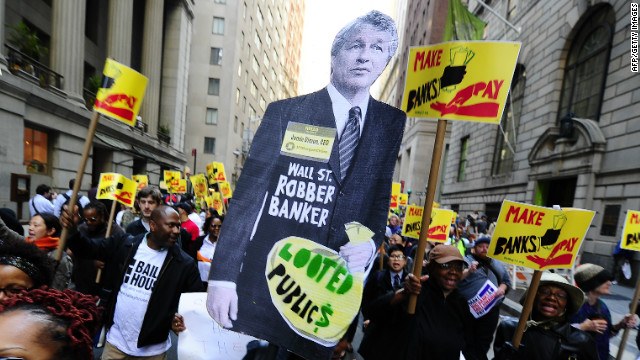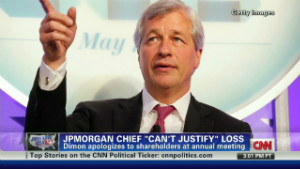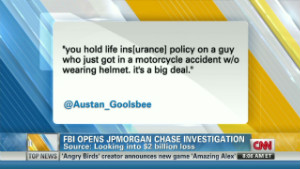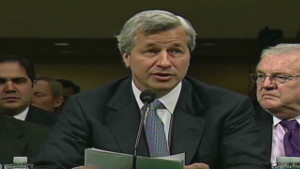There just isn't enough aspirin in the world to get rid of this headache of mine. Another week of total brain damage...but I have a plan, and it is so "Crazy" it might just work...because "doing the right thing" in "good faith" doesn't compute with the Wonder that is JPMorgan Chase. **Stay Tuned**
***************************
Dimon's $23 million payday isn't the problem
updated 8:36 AM EDT, Fri May 18, 2012

A cutout figure of JPMorgan Chase CEO Jamie Dimon hovers above a May 2011 protest against banks on Wall Street.
STORY HIGHLIGHTS
- JPMorgan CEO Jamie Dimon gets $23 million pay package despite the bank's $2 billion loss
- Ingo Walter and Jennifer Carpenter: Real concern should not be level of executive pay
- They say bank shareholders and employees have incentives to take risks to make more money
- Focus on changing risk incentives rather than amount of pay, the writers say
Editor's note: Ingo
Walter is the Seymour Milstein professor of finance, corporate
governance and ethics, and Jennifer Carpenter is an associate professor
of finance in the Stern School of Business at New York University.
(CNN) -- Here we go again. The perennial question
of: "Would you rather own shares in a major financial conglomerate or
manage one?" comes up as JPMorgan Chase loses more than $2 billion in
trading bets.
The answer seems clear.
If you're an executive who manages the money, you're likely to get a
large paycheck and bonus even if you're responsible for the loss,
directly or indirectly. Jamie Dimon is still getting his $23 million.
Shares of the major banks
continue to trade well below book value and generate miserable
performance metrics -- and have over the years been very poor
investments -- while senior executives and key employees continue to
walk away with vastly outsize earnings, even when they oversee massive
losses.
Shareholders certainly
have reasons to object to huge executive pay packages, especially
ordinary people whose fund managers have put in stakes of the bank
shares in their pension and mutual fund accounts.
But the level of
executive compensation comes out of shareholders' pockets. If
shareholders are unhappy with the division of the spoils, they have no
one to blame but themselves. After all, they can always take their money
elsewhere if they don't think their cut of bank profits is big enough.
The real concern for
everyone -- including regulators and taxpayers -- is not the level of
pay handed out to executives, nor how profits in a company are divided
between employees and shareholders, but rather, the incentives for
risk-taking that bank pay apparently continues to create.
Follow @CNNOpinion on Twitter and Facebook.com/cnnopinion.
Regulators have called
for deferred compensation to address the incentive problem. If deferred
compensation presents employees with serious exposure to potentially big
losses, they'll have a major stake in the long-term solvency of the
business and help spare taxpayers the cost of bailing out firms that
have become too systemically important to fail.
 FBI looking into bank's huge loss
FBI looking into bank's huge loss
 Professor: Fair to question Volcker Rule
Professor: Fair to question Volcker Rule
 From AIG to JPMorgan, why London?
From AIG to JPMorgan, why London?
 Carney: Well-run bank can make bad calls
Carney: Well-run bank can make bad calls
But forcing employees to
bear significant exposure to potentially big losses may come at a price.
Employees may require higher salaries to compensate for increased risk.
We're seeing this reflected in recently announced pay packages. The
price is paid primarily by shareholders while the benefits of any
improvement in financial stability accrue to society as a whole.
Deferred cash
compensation makes employees debt holders, so it ought to reduce
risk-taking. So should compensation in a form that explicitly converts
to equity when the firm gets into trouble and is bailout-proof.
Deferred stock
compensation, however, may do just the opposite. As long as there are
implicit government guarantees for financial institutions that are
considered too big, too complex or too interconnected to fail, the value
of those institutions' stocks increases with risk-taking.
The more risk a bank
takes, the greater the value of government guarantees and potential
bailouts. This value gets passed on to the bank's stock price. If
employees are paid in deferred stock, the risk incentives are then
passed on to them, encouraging them to speculate.
Rules that mandate more pay in the form of stock miss the point. It helps align the interests of employees and shareholders, but it fails to align their interests with those of taxpayers.
Ultimately, it's the
taxpayers who are held hostage. They care about the size of bailout
necessitated by excessive risk-taking taken by banks, and about economic
growth, but not about how bank profits are divided per se, since they
don't get a cut in any case.
Regulators are aware
that bank stockholders have an overriding desire to take more risk than
is good for society because chronic under-pricing of government
guarantees makes it profitable for banks to seek risky assets and lever
them as much as possible. This is the reason for capital requirements
and the Volcker Rule, which tries to restrict risk-taking.
Recent attempts to
reform compensation overlook how complicated the compensation process
can be. Trying to discourage risky behavior is like fighting an uphill
battle against shareholders who like risk. Moreover, risk incentives are
harder to measure, and their regulation is easy to circumvent.
Criticizing the
compensation packages of JPMorgan's Dimon and his senior associates
might be popular with voters, but regulators would be better off
focusing on the source of the problem -- the mispricing of government
guarantees that create perverse risk incentives in the first place.
Pricing deposit
insurance differently or banning activities such as proprietary trading
would give shareholders and employees alike an incentive to rein in
risk-taking. Employee compensation would then reform itself.
No comments:
Post a Comment